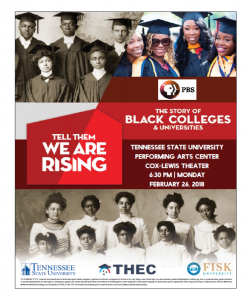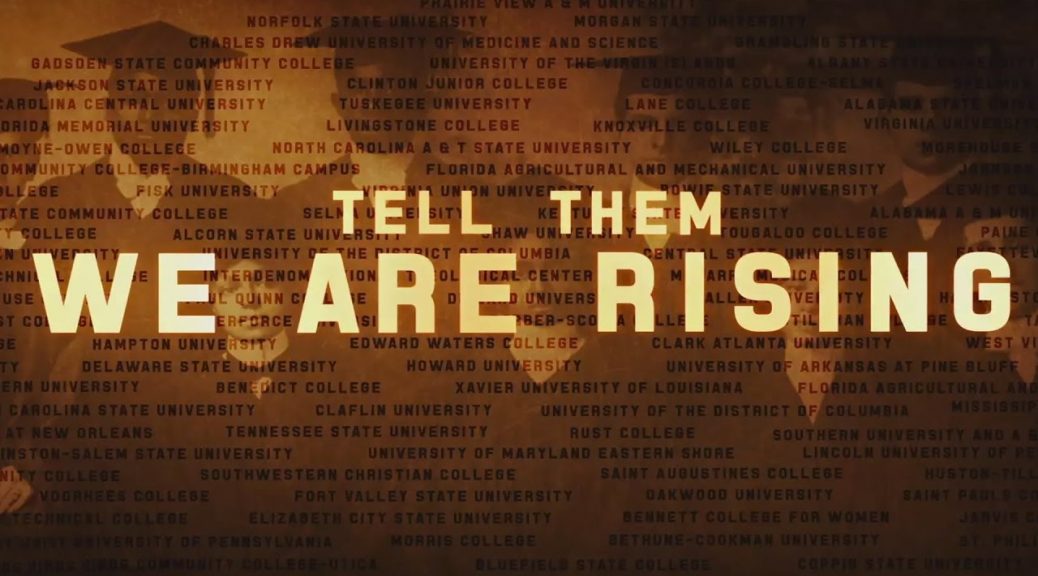NASHVILLE, Tenn. (TSU News Service) – When Sydnie Davis was pondering what higher education institution to attend after graduating from high school, the Nashville native concluded she wanted an HBCU experience – a Big Blue one.
 “When I got here, I fell in love,” says Davis, a fifth generation TSU Tiger now in her junior year. “I saw what my family had seen the many generations before me. I feel I’ve been able to succeed like no other, and the family atmosphere and love you feel on campus is overwhelmingly positive. HBCUS are one of the last safe havens for African American students.”
“When I got here, I fell in love,” says Davis, a fifth generation TSU Tiger now in her junior year. “I saw what my family had seen the many generations before me. I feel I’ve been able to succeed like no other, and the family atmosphere and love you feel on campus is overwhelmingly positive. HBCUS are one of the last safe havens for African American students.”
Davis is among thousands of students across the country who each year attend historically black colleges or universities rather than predominantly white institutions. Their reasons will be part of a discussion on Monday, Feb. 26, that will take place before the showing of the PBS documentary, “Tell Them We Are Rising: The Story of Black Colleges and Universities,” which shares the history and impact of HBCUs.
The event is at 6:30 p.m. in TSU’s Performing Arts Center and is sponsored by TSU, Fisk and the Tennessee Higher Education Commission. The documentary first aired nationwide on PBS on Feb. 19 and will be available on local public broadcasting stations through March 22.
“Tell Them We Are Rising is a compelling documentary and gives an in-depth look at the need and establishment of historically black colleges and universities for people of color,” says Tennessee State University President Glenda Glover. “TSU, like other HBCUs, has been, and remains, a cradle for black achievement that all of America should proudly embrace.”
Dr. Glover says she’s proud of the contributions the institution and other HBCUs have made, and continue to make, to society.
“Through our doors have passed some of the country’s most notable and successful individuals, with outstanding contributions to the nation, and the world. Among these have been scientists, engineers, doctors, educators, entertainers, business people, sports legends, and the list goes on. Regardless of the challenges HBCUs may face, our institutions will always rise up, and strive to produce the very best.”
Founded in 1912 as the Agricultural and Industrial Normal School for Negroes, Tennessee State University today is a comprehensive, urban, coeducational, land-grant institution serving students from all across the globe. From 247 students who began their academic career on June 19, 1912, the University has more than 8,000 students on two locations—the 500-acre main campus and the downtown Avon Williams campus. TSU has earned a top-20 ranking for Historically Black Colleges and Universities according to U.S. News and World Report, and rated as one of the top universities in the country by Washington Monthly for social mobility, research and community service.
The University is recognized as a Carnegie Doctoral/Research institution and offers 38 bachelor’s degrees, 25 master’s degrees and seven doctoral degrees. It also boasts an outstanding athletics and sports legacy with 40 Olympic medals, and has produced outstanding graduates who are impacting the world in science, research, the arts, theater and many other areas.
TSU mass communications major Tramon Jones says TSU’s esteemed alumni, like media mogul Oprah Winfrey, Olympic gold medalist Wilma Rudolph and NFL Hall of Famer Richard Dent, were part of his attraction to the university.
“When I saw that, I knew TSU was the place for me,” says Jones, a junior from Columbia, Tennessee.
Andrianna Johnson, a TSU psychology major who will be graduating in May, says she’s glad she attended an HBCU, especially TSU.
“TSU has been one amazing experience,” says the Chicago native. “The love, the support, the activism that happen within the community around TSU is also amazing. That’s definitely a highlight of coming to Tennessee State.”
HBCUs have a history dating back to 1837, but most of them began as Freedmen’s schools after 1864, and grew to some 240 schools, colleges, and universities. Some 119 were eligible for collegiate accreditation by 1929. Today, there are about 100 accredited HBCUs – and their impact is felt nationwide, historians say.
“Without the HBCUs, thousands of highly educated college graduates will not be produced in the U.S.,” says Dr. Bobby Lovett, a nationally recognized historian and former TSU history professor.
Dr. Learotha Williams, an associate professor of history at TSU who will be a panelist at Monday’s event, agrees.
“HBCUs … produce the vast majority of the professional class,” says Williams. “Doctors, lawyers, professors, engineers. If you search their economic background, you’ll see that in some way or another they were affiliated with an HBCU, either as an undergrad, or via graduate school.”
Department of Media Relations
Tennessee State University
3500 John Merritt Boulevard
Nashville, Tennessee 37209
615.963.5331
About Tennessee State University
With more than 8,000 students, Tennessee State University is Nashville’s only public university, and is a comprehensive, urban, co-educational, land-grant university offering 38 bachelor’s degree programs, 25 master’s degree programs and seven doctoral degrees. TSU has earned a top 20 ranking for Historically Black Colleges and Universities according to U.S. News and World Report, and rated as one of the top universities in the country by Washington Monthly for social mobility, research and community service. Founded in 1912, Tennessee State University celebrated 100 years in Nashville during 2012. Visit the University online at tnstate.edu.
